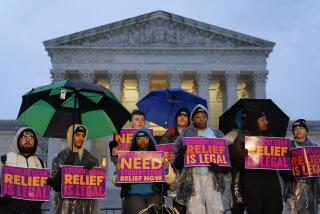Court Will Accelerate Review of Key Gramm-Rudman Issue
- Share via
WASHINGTON — The Supreme Court agreed Monday to an accelerated review of a key provision of the Gramm-Rudman budget-balancing law, setting the stage for a ruling on the constitutionality of the precedent-setting legislation by this summer.
The justices announced that they will hear two hours of oral argument in the case April 23 and indicated that they will decide the issue before recessing early in July.
The case not only involves billions of dollars in federal spending but represents a major test of the constitutional separation of powers--the “checks and balances” dividing authority among the branches of government.
Enforcement Key Element
At issue is the law’s mechanism for instituting automatic, across-the-board budget cuts when Congress fails to meet its deficit-reduction targets. The law places that authority in the hands of the comptroller general, who is the head of the General Accounting Office, a watchdog auditing and investigative agency.
Earlier this month, a special three-judge panel of the federal district court here struck down that mechanism as unconstitutional. The panel said that the law improperly placed the enforcement powers reserved for the executive branch in the hands of an official who, unlike members of the President’s Cabinet, can be removed from office by Congress.
Lawyers for the Senate, the House and the comptroller general filed appeals with the high court. The Justice Department, along with a group of 12 congressmen and the National Treasury Employees Union, urged that the panel’s ruling in the case (Bowsher vs. Synar, 85-1377) be upheld.
‘Fallback’ Provision Intact
The panel left intact a “fallback” provision in the law allowing Congress itself to enact the deficit-reduction cuts prepared by the comptroller general.
The law, which draws its name from two of its sponsors, Sens. Phil Gramm (R-Tex.) and Warren B. Rudman (R-N.H.), sets up a five-year timetable aimed at balancing the federal budget by 1991.
The first $11.7-billion worth of spending cuts under the law are scheduled to take effect on Saturday. The panel invalidated those cuts, but the cuts will take effect anyway because the panel delayed the effect of its ruling pending the Supreme Court’s decision.
Court backs right to sue airports over jet noise. Part II, Page 1.
More to Read
Get the L.A. Times Politics newsletter
Deeply reported insights into legislation, politics and policy from Sacramento, Washington and beyond. In your inbox twice per week.
You may occasionally receive promotional content from the Los Angeles Times.










